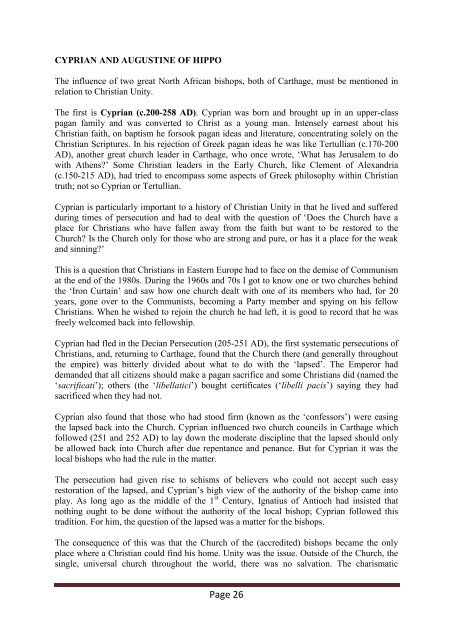Digging Out the Embedded Church - The Maranatha Community
Digging Out the Embedded Church - The Maranatha Community
Digging Out the Embedded Church - The Maranatha Community
Create successful ePaper yourself
Turn your PDF publications into a flip-book with our unique Google optimized e-Paper software.
CYPRIAN AND AUGUSTINE OF HIPPO<br />
<strong>The</strong> influence of two great North African bishops, both of Carthage, must be mentioned in<br />
relation to Christian Unity.<br />
<strong>The</strong> first is Cyprian (c.200-258 AD). Cyprian was born and brought up in an upper-class<br />
pagan family and was converted to Christ as a young man. Intensely earnest about his<br />
Christian faith, on baptism he forsook pagan ideas and literature, concentrating solely on <strong>the</strong><br />
Christian Scriptures. In his rejection of Greek pagan ideas he was like Tertullian (c.170-200<br />
AD), ano<strong>the</strong>r great church leader in Carthage, who once wrote, „What has Jerusalem to do<br />
with A<strong>the</strong>ns?‟ Some Christian leaders in <strong>the</strong> Early <strong>Church</strong>, like Clement of Alexandria<br />
(c.150-215 AD), had tried to encompass some aspects of Greek philosophy within Christian<br />
truth; not so Cyprian or Tertullian.<br />
Cyprian is particularly important to a history of Christian Unity in that he lived and suffered<br />
during times of persecution and had to deal with <strong>the</strong> question of „Does <strong>the</strong> <strong>Church</strong> have a<br />
place for Christians who have fallen away from <strong>the</strong> faith but want to be restored to <strong>the</strong><br />
<strong>Church</strong>? Is <strong>the</strong> <strong>Church</strong> only for those who are strong and pure, or has it a place for <strong>the</strong> weak<br />
and sinning?‟<br />
This is a question that Christians in Eastern Europe had to face on <strong>the</strong> demise of Communism<br />
at <strong>the</strong> end of <strong>the</strong> 1980s. During <strong>the</strong> 1960s and 70s I got to know one or two churches behind<br />
<strong>the</strong> „Iron Curtain‟ and saw how one church dealt with one of its members who had, for 20<br />
years, gone over to <strong>the</strong> Communists, becoming a Party member and spying on his fellow<br />
Christians. When he wished to rejoin <strong>the</strong> church he had left, it is good to record that he was<br />
freely welcomed back into fellowship.<br />
Cyprian had fled in <strong>the</strong> Decian Persecution (205-251 AD), <strong>the</strong> first systematic persecutions of<br />
Christians, and, returning to Carthage, found that <strong>the</strong> <strong>Church</strong> <strong>the</strong>re (and generally throughout<br />
<strong>the</strong> empire) was bitterly divided about what to do with <strong>the</strong> „lapsed‟. <strong>The</strong> Emperor had<br />
demanded that all citizens should make a pagan sacrifice and some Christians did (named <strong>the</strong><br />
„sacrificati‟); o<strong>the</strong>rs (<strong>the</strong> „libellatici‟) bought certificates („libelli pacis‟) saying <strong>the</strong>y had<br />
sacrificed when <strong>the</strong>y had not.<br />
Cyprian also found that those who had stood firm (known as <strong>the</strong> „confessors‟) were easing<br />
<strong>the</strong> lapsed back into <strong>the</strong> <strong>Church</strong>. Cyprian influenced two church councils in Carthage which<br />
followed (251 and 252 AD) to lay down <strong>the</strong> moderate discipline that <strong>the</strong> lapsed should only<br />
be allowed back into <strong>Church</strong> after due repentance and penance. But for Cyprian it was <strong>the</strong><br />
local bishops who had <strong>the</strong> rule in <strong>the</strong> matter.<br />
<strong>The</strong> persecution had given rise to schisms of believers who could not accept such easy<br />
restoration of <strong>the</strong> lapsed, and Cyprian‟s high view of <strong>the</strong> authority of <strong>the</strong> bishop came into<br />
play. As long ago as <strong>the</strong> middle of <strong>the</strong> 1 st Century, Ignatius of Antioch had insisted that<br />
nothing ought to be done without <strong>the</strong> authority of <strong>the</strong> local bishop; Cyprian followed this<br />
tradition. For him, <strong>the</strong> question of <strong>the</strong> lapsed was a matter for <strong>the</strong> bishops.<br />
<strong>The</strong> consequence of this was that <strong>the</strong> <strong>Church</strong> of <strong>the</strong> (accredited) bishops became <strong>the</strong> only<br />
place where a Christian could find his home. Unity was <strong>the</strong> issue. <strong>Out</strong>side of <strong>the</strong> <strong>Church</strong>, <strong>the</strong><br />
single, universal church throughout <strong>the</strong> world, <strong>the</strong>re was no salvation. <strong>The</strong> charismatic<br />
Page 26








